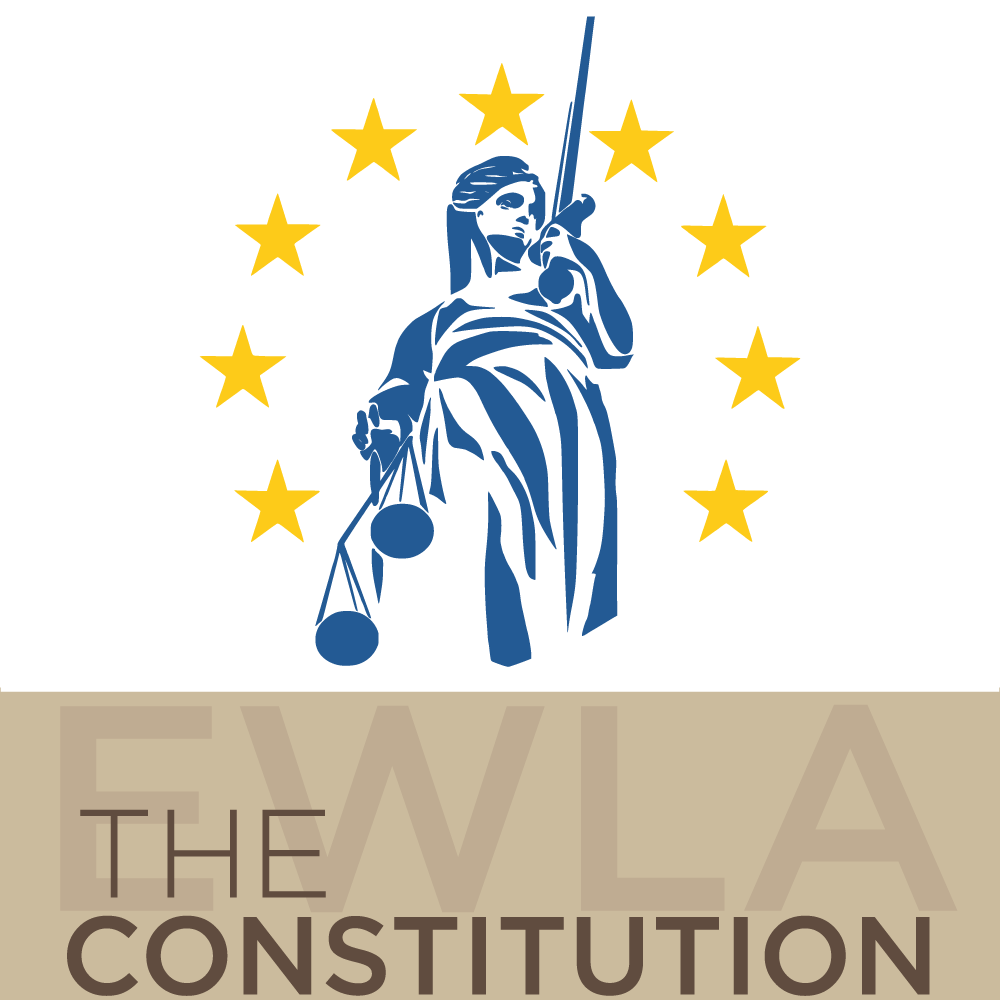Constitution of EWLA
Constitution of the European Women Lawyers Association
Article 1: Name
The association is an international non-profit association, named "European Women Lawyers Association", abbreviated "EWLA", hereafter "EWLA".
Article 2: Registered office
The registered office of EWLA is situated in the Flemish Region and can be transferred by decision of the Executive Committee in accordance with the language legislation and the Code on companies and associations.
Article 3: Object and activities
3.1 EWLA is an international non-profit association with a philanthropic, scientific and educational purpose.
The purpose of EWLA is:
- improving the understanding of European legislation concerning equal opportunities, in particular as regards women, and its consequences;
- supporting exchanges between women lawyers throughout the European Union, the European Economic Area and the European Free Trade Association, for example by creating the closest possible contacts with bars, law societies, associations of women lawyers, faculties and schools of legal education and research, both at national and international level, and with European authorities and other public authorities;
- conducting of studies, research and conferences by European women lawyers, with organizations and institutions both within Europe and beyond its borders, with a view to achieving equal rights and opportunities;
- the strengthening of links between women lawyers belonging to the European Union, the European Economic Area and the European Free Trade Association and the encouragement of meetings, cooperation and understanding between women lawyers;
- The representation and defence of the interests of women before the institutions of the European Union, concerning in general any question of interest to women and in particular in legal matters, take place without prejudice to the main scientific and educational character of EWLA.
3.2 EWLA will pursue the achievement of its purpose in particular by:
- holding conferences and other events;
- disseminating information;
- issuing observations or opinions on legal questions relating to the policies of the European Union or on decisions rendered by the courts of the European Union, the European Free Trade Association or by the European Court of Human Rights;
- proposing or commenting on draft legislation from the European Union, the European Economic Area and the European Free Trade Association or the Council of Europe;
- in general, by undertaking any activity, including cooperation with existing institutions, organizations and networks, in order to facilitate the achievement of the objectives of EWLA and any other activity likely to assist in the achievement of the aforementioned objectives and activities.
4. Members
4.1 Full Members
Any woman who is a lawyer in accordance with the customs and practices of a member state of the European Union, the European Economic Area or the European Free Trade Association in which she has her main residence, or any woman who studied law in one of these member states or is a student, is eligible for membership (hereafter named "Individual Member").
Any association of women who exercises a legal profession, has legal personality and whose main office is located in a member state of the European Union, the European Economic Area or the European Free Trade Association is eligible for membership (hereafter named "Corporate Member").
4.2 Associated Members
Upon approval by EWLA’s Executive Committee, the following can become associated members:
- Any woman who is a lawyer in accordance with the customs and practices in a state outside of the European Union, the European Economic Area or the European Free Trade Association in which she has her main residence, or any woman who studied law or is a student and who does support the aims of EWLA;
- Each association of women who exercises a legal profession, has legal personality and whose main office is situated in a state outside of the European Union, the European Economic Area or the European Free Trade Association and who has adopted articles of association that are in conformity with the aims of EWLA.
- all women members of the judiciary of international courts and all senior public servants working for any international institution/organisation,
- as well as all women academics teaching in a university, having their residence in a Member State of the European Union, or the European Economic Area, or the European Free Trade Association, or having the nationality of one of these, whether still working or retired,
- all former EWLA presidents.
4.3 Honorary Members
Can become Honorary Member:
- all women members of the judiciary, all legal practitioners, all Advocate Generals and all lawyers who are or have been members of the Court of Justice of the European Union, the European Court of Human Rights, the Court of the European Free Trade Association, Constitutional Courts, Courts of Cassation or other national Supreme Courts, national Governments and Parliaments of all Member States of the European Union, or the European Economic Area, or the European Free Trade Association,
- all women members of the judiciary of international courts and all senior public servants working for any international institution/organisation,
- as well as all women academics teaching in a university, having their residence in a Member State of the European Union, or the European Economic Area, or the European Free Trade Association, or having the nationality of one of these, whether still working or retired,
- all former EWLA presidents.
Article 5: Adherence, resignation and exclusion
5.1 Each candidacy shall address the EWLA Executive Committee in writing/electronically and apply for membership. The application contains a confirmation in which the candidate declares to comply with the articles of association. The application also contains the choice for Full Member or Associated Member. The Honorary Members are elected by the Council of Representatives on proposition of a Full Member.
The Executive Committee accepts the candidacy when the conditions of 4.1 and 4.2 are fulfilled.
5.2 Each member can resign at any moment from EWLA by way of written or electronic notification to the Executive Committee. The resignation is effective on the 1st of January of the following year.
In exercising the rights set out in this Constitution all members will act in the best interests of EWLA.
5.3 The exclusion of a member for cause can be proposed by the Executive Committee after hearing the involved member. The exclusion is decided by the General Assembly with a two third majority of the present or represented members. The Executive Committee can suspend the involved member until the decision of the General Assembly. The members who have resigned or are excluded have no possible claim on the assets of EWLA.
Article 6: Membership fees
The Full Members, the Corporate Members and the Associated Members pay yearly membership fees established by the General Assembly on proposition of the Council of Representatives.
Article 7: Membership fees
7.1 Competences
The General Assembly has the following competences:
- the modification of the articles of association
- the nomination and resignation of Representatives and, if necessary, the statutory auditor
- the full discharge to the members of the Executive Committee and, if necessary, the statutory auditor.
- the voluntary dissolution of EWLA
- the exclusion of a member
- the affairs in the Code on companies and associations.
7.2 Composition
The General Assembly is composed of Full Members, Representatives of Corporate Members and Associated Members (individual and collective). Only the Full Members (individual and collective) have voting right. Each Full Member has one vote. Other categories of members can attend the meeting but have not the right to vote.
7.3 Meeting and convocations
The General Assembly convenes at least once a year at the registered office of EWLA or any other place indicated in the convocation.
The convocation is prepared by the Secretary General and is sent by means of ordinary letter or e-mail, at least 8 days before the meeting. The convocation contains the agenda and the guiding documents, if any.
The General Assembly must convene when the President and the Secretary General calls it or when at least 5% of the members ask for it.
7.4 Decision making
The General Assembly can only deliberate validly when at least 5% of its members are present or represented. If this quorum is not met, the present or represented Full Members can decide by ordinary majority of the votes.
Full Members can be represented at the General Assembly by another Full Member by way of a power of attorney. Only items on the agenda can be deliberated at the General Assembly.
Resolutions are taken by ordinary majority of the votes, except for other provisions in these articles of association or the Code on companies and associations.
The resolutions are brought to the knowledge of the members by way of e-mail. The resolutions are kept as well and are available for the members.
Article 8: Amendment of the articles of association and dissolution of EWLA
8.1 Each proposal for a modification of these articles of association or dissolution of EWLA is initiated by the Executive Committee or at the request of at least 5% of the Full Members. The Executive Committee brings the proposal for a modification of the articles of association or dissolution to the knowledge of the members at least one month before the General Assembly who has to decide on the proposal.
8.2 The General Assembly can only deliberate validly on the proposal when at least one third of the members is present or represented. The proposal for a modification of the articles of association or dissolution is adopted when it receives the majority of two third of the expressed votes.
8.3 The dissolution is executed in accordance with the provisions of the Code on companies and associations. The net assets will be distributed to a non-profit objective. The provisions above are applicable regardless of the formalities foreseen in Book 2 of the Code on companies and associations.
Article 9: Council of Representatives
9.1 Composition
The Council of Representatives is in principle composed of one Representative of each member state. The Representatives are appointed by the General Assembly. The Representatives are appointed for a period of two years which is in general renewable three times. If there is no new candidate for a member state, the current Representative can be re-elected until there is a new candidate. The General Assembly can decide to appoint a substitute Representative for each member state.
When before the ending of the period a mandate falls open, the Council of Representatives can appoint a new Representative by way of co-optation, in the expectation of a decision of the General Assembly. The Council of Representatives brings this co-optation to the knowledge of the members.
The mandate of a Representative takes an end by her death, dismissal, declaration of incompetence, the placement under administrative supervision or the end of the period.
9.2 Competences
- The Council of Representatives appoints, from among its members, a President, one or two Vice-Presidents, a Treasurer and a Secretary General.
- The Council of Representatives makes a proposal for membership fees for the General Assembly.
- The Council of Representatives decides on the introduction of the Honorary Members to EWLA.
9.3 Meeting and convocations
The Council of Representatives deliberates at least four times a year on convocation by the President by way of letter or e-mail.
9.4 Decision making
The Council of Representatives can only deliberate validly if at least one fifth of the Representatives is present of represented. Resolutions are adopted by ordinary majority of the present or represented Representatives. In the event of a tied vote, the vote of the President is decisive.
9.5 Minutes book
The decisions of the Council of Representatives are kept by the Secretary General, who keeps them available to the members of EWLA.
Article 10: Executive Committee
10.1 Composition
The Executive Committee is composed of the President, the Vice-President(s), the Treasurer and the Secretary General. The members of the Executive Committee are appointed by the Council of Representatives for an indefinitely renewable period of 3 years.
10.2 Competences
The Executive Committee has all the competences of administration and management, except for the matters reserved for the General Assembly and the Council of Representatives.
The Executive Committee can delegate the daily management of EWLA to a person of its choice.
10.3 Meetings and convocation
The Executive Committee meets as much as it considers necessary on convocation of the President. The meetings of the Executive Committee can be held by way of videoconference.
10.4 Decision making
All members of the Executive Committee have to be present.
The decisions are taken by ordinary majority of the present or represented members. In the event of a tied vote, the vote of the President is decisive.
Article 11: Representation of EWLA
EWLA can be legally represented by the President, a Vice-President or the Treasurer. Within the boundaries of the daily management, EWLA can also be represented by someone in charge of the daily management. EWLA is also, within the boundaries of their mandate, validly represented by special proxyholders with written proxy.
Article 12: Budget and accounts
The financial year of EWLA starts on the 1st of January and ends on the 31st of December. Each year the annual accounts will be prepared by the Executive Committee, approved by the General Assembly and registered in accordance with the Code on companies and associations.
Article 13: General provisions
All that is not governed by the present articles of association is ruled by the Belgian Code on companies and associations.
Liersesteenweg 21
2640 Mortsel







